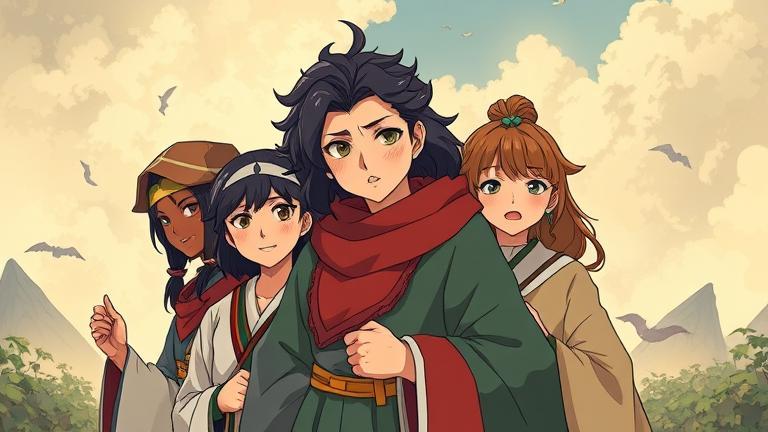As Winry surveyed the faces before her, she was overwhelmed by the unity that pulsed through the crowd. Each individual bore stories of struggle and strength, but together, they represented something much greater. ‘Together, we can transform our pain into purpose,’ she continued, her voice gaining strength. Beside her, Malik, a healer with a gift for nature’s remedies, spoke up. ‘Every herb and every pulse we felt involuntarily connected us.’ His earnestness reached deep into the heart of the crowd and sparked a renewed fire in their spirits.
The air was electric with hope as Lara, a kind-hearted portrait artist turned healer, stepped forward with a new canvas. ‘Let’s immortalize our journey,’ she announced, revealing her brush and colors. With the first stroke, she painted waves of connection that bridged the gaps between cultures and languages. ‘Our creativity can heal the world too,’ she declared, igniting the passion of artisans in attendance.
Elias, a scholar and the voice of reason among them, raised his hand as he took a step forward. ‘But we must not forget our past,’ he cautioned. ‘We carry the weight of history in our hearts, and to move forward, we must acknowledge it.’ He gestured to an elderly woman in the crowd who had lost family to the conflicts. Her silent tears spoke of anguish echoing across many lives lost and assumed forgotten.
Winry approached her, placing a comforting hand on the woman’s shoulder. ‘Your pain isn’t just a memory, it’s a part of our mission here. We honor your family by dedicating ourselves to healing others,’ she whispered, eyes welling with empathy. This moment of connection melted the barriers built by fear and mistrust.
Growing bolder, Malik proposed they unite their talents for a grand festival that would showcase their healing crafts. ‘Imagine bringing the surrounding communities together; we could establish peace through our shared gifts!’ His eyes shone with possibilities.
Everyone nodded, excitement swelling in the air. They discussed ideas, dividing projects. Lara would lead the painting aspect while Elias organized discussions. Tasha, a musician whose melodies had soothed countless souls, offered to compose music that would accompany the festivities.
As plans solidified under the sun, others joined, determined to bring additional art, food, and stories. They spoke of their dreams—Erik, a metal craftsman who had similarly faced prejudice, wished to create benches where stories of their journeys could be shared and reflected on. ‘Art can be a bridge,’ he asserted, and they all agreed.
Days turned into weeks, and the festival took shape, becoming a testament to their hard work and cohesion. As the day approached, Winry felt a blend of anxiety and excitement. When the festival finally commenced, the vibrant streets filled with laughter, conversations, and healing energies. Uniting warring clans became secondary to celebrating life itself.
During a critical moment, the music swelled, and people flocked to a huge mural—not just art, but an emblem of their newfound family. Winry, gazing at it along with the elderly woman who spoke volumes through her smile, felt the essence of what they had created.
And just when they thought all barriers had shattered, a group from a neighboring territory approached, skepticism etched on their faces, ready to disrupt. Winry and Malik stood at the forefront, united in their resolve. ‘We welcome you,’ Winry pronounced, ‘not as enemies, but as potential allies.’ This moment became pivotal, bridging not just gaps between groups but forcing the entire gathering to reassess what love could mean across divides.
Dialogue and sincerity awoke mutual understanding. They talked late into the evening, sharing their traumas and hopes. Layers of mistrust unfurled like petals, allowing the sun of compassion to peek through.
By the end of the festival, the seeds of empathy were sown. Winry beamed, knowing they were more than healers, more than just a family; they were the architects of a new legacy—one where love, in spite of barriers, healed the deepest wounds.
